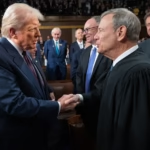A major legal confrontation is unfolding between the U.S. judiciary and the Trump administration following the controversial expulsion of several hundred Venezuelans.
Early on Monday, federal judge James Boasberg requested that the government provide explanations regarding the deportation of 238 Venezuelan nationals, despite a suspension order issued by the court.
According to Reuters, these expulsions involved individuals accused of belonging to the Tren de Aragua gang, a feared Venezuelan criminal organization.
The White House justified the operation by invoking a rarely used law, the Alien Enemies Act of 1798, historically applied only during wartime.
Judge Boasberg scheduled a hearing for Monday at 5:00 p.m. (Eastern Time) to determine whether the expulsions took place before or after the issuance of his order.
The American newspaper Reuters reported that this judicial decision came in response to a petition filed by the American Civil Liberties Union (ACLU) and other human rights organizations.
In a court document, the Department of Justice acknowledged that the judge’s order appeared in the online court system at 7:26 p.m. on Saturday evening. In response, El Salvador, the country to which the expelled individuals were sent, released footage showing their disembarkation. “Oops… too late,” Salvadoran President Nayib Bukele commented ironically on X, formerly known as Twitter, according to Reuters.
In response to the criticisms, the Trump administration firmly defended its actions.
On Sunday, White House spokeswoman Karoline Leavitt denied any violation of the judge’s order and questioned the judiciary’s authority in this case. “A single judge in a single city cannot dictate the movements of an aircraft… filled with foreign terrorist aliens who have been physically removed from American soil,” she stated, according to Reuters.
The U.S. administration maintains that these individuals pose a security threat and that their expulsion falls within the scope of a sovereign executive decision. This stance fuels a broader legal debate on the separation of powers in the United States and could lead to a constitutional crisis, in which the executive branch disregards judicial rulings. Some members of the MAGA group in Congress have already raised the possibility of impeaching judges who issue rulings contrary to the will of the far-right U.S. government.
These recent expulsions reflect a broader trend within the Trump administration of challenging the judiciary’s role in overseeing its decisions. Since taking office, the president has sought to expand executive powers, particularly in matters of immigration.
According to Reuters, Tom Homan, Trump’s special immigration adviser, asserted that the flights had already departed U.S. soil before the judge’s order was issued and that additional flights would follow. “Once you’re outside the borders, it is what it is. But they were already in international waters, close to landing. You know what? We did what we had to do,” he said on Fox News.
When asked whether these expulsions would continue, Homan was unequivocal: “Another flight, another flight every day. We’re not stopping. I don’t care what the judges think.”
This judicial standoff highlights the growing tensions between the Trump administration and federal courts. In several cases, human rights organizations have accused the government of failing to comply with judicial rulings.
With a Congress largely aligned with the president’s decisions, the judiciary remains one of the last checks on executive power. The outcome of this battle could have far-reaching implications for the separation of powers in the United States and the way immigration laws are enforced by the government.








